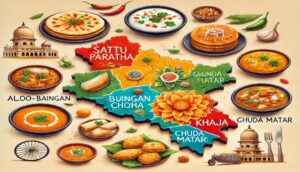Understanding Carbohydrates: The Good, The Bad, and The Balanced Diet

Patna: As the conversation around healthy eating intensifies, carbohydrates—commonly referred to as carbs—often find themselves in the spotlight. While some diets demonize them as the culprits behind weight gain, experts assert that not all carbs are created equal, and they can play a vital role in maintaining energy levels and overall health.
The Complexity of Carbs
According to nutrition experts, categorizing carbohydrates as “good” or “bad” oversimplifies a complex topic. Instead, carbs can be better understood through their composition and impact on the body. Foods high in fiber and starch, such as whole grains, beans, quinoa, legumes, oats, and brown rice, take longer to digest. They release energy slowly, aiding in blood sugar control and providing a prolonged feeling of fullness. These foods also come packed with essential vitamins, minerals, antioxidants, and probiotics.
The Quick and the Risky
On the other end of the spectrum are foods rich in natural or added sugars, such as fruits, vegetables, milk, rice, flour, sugar, and soda. While fruits and milk offer nutritional benefits—vitamins in fruits and protein in milk—ultra-processed items like soda can be detrimental to health. These quick-digesting carbs can cause blood sugar levels to spike, and they offer little to no nutritional value.
The Balance in Daily Diet
Experts recommend that “good” carbohydrates should make up 40-50% of one’s daily caloric intake, balanced with appropriate amounts of protein and healthy fats. However, the trend toward low-carb diets aimed at weight loss and achieving a lean body is affecting this balance. Such diets often focus on high protein and fat consumption while avoiding grains, starchy vegetables, and fruits. Although these diets can help with weight loss, they also pose risks, including an increased chance of developing type-2 diabetes and metabolic syndrome. Extended adherence to a low-carb diet can also lead to vitamin and mineral deficiencies, weakened bones, and digestive issues.
The Final Takeaway
Foods like whole grains (oats, millet, ragi, jowar, wheat), whole fruits with peel, pulses, and green vegetables are excellent sources of beneficial carbs. These foods are rich in fiber, vitamins, and minerals, helping maintain healthy sugar levels and providing sustained fullness. In contrast, foods like biscuits, soda, and sweets contain “bad” carbs, offering minimal nutrients and contributing to calorie and sugar level spikes.
In summary, understanding the complexities of carbohydrates is essential for a balanced and nutritious diet. Consume them wisely and consult with healthcare professionals for personalized dietary advice.








